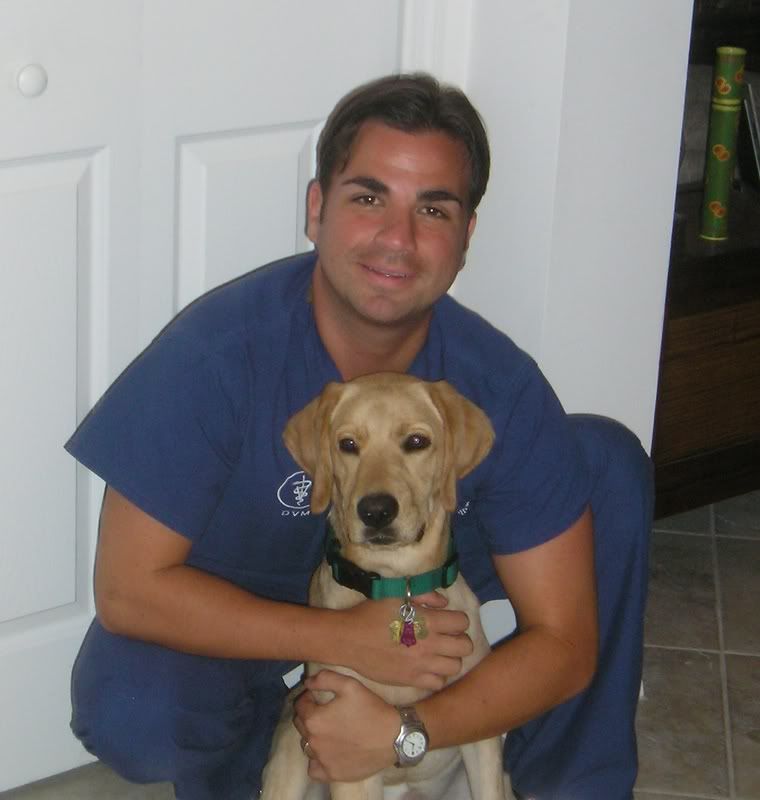In this episode:
Special guest host and blogger, Melissa Welton, CVT
Personal Comment: The unsung hero of veterinary medicine
Transcript of personal comment from this episode of The WebDVM:

As pet owners, when it comes to our pets' health care, we tend to center our attention on the veterinarian, for it is he who we see examine our furry family members, interpret their clinical signs, offer a list of possible diseases, make diagnostic recommendations and interpretations, formulate a treatment plan, and perform surgery. Indeed we should see veterinarians as the engines that drive our pets' healthcare. However, like the car that cannot function with an engine alone, needing other integral parts to translate that power into a functional automobile, so does the veterinary technician channel the veterinarian's vision into a fully functional hospital. Tonight's personal comment, is a tribute to these individuals that perform an invaluable contribution to your pets' healthcare, but do not always receive the recognition they deserve.
So what does the certified veterinary technician do? Well, let us start with the veterinarian's initial assessment. He has an idea of possible diseases based on history and physical examination, and consequently orders diagnostics to narrow down his list. Whether it is blood work, urinalysis, x-rays, or EKG, to name a few, it is the certified technicians who collect the blood and urine, shoot the x-rays, and hook up and run the EKG. All lab work is properly processed, packaged and sent out by the veterinary technician, or in the case of ours and many other hospitals, the technicians actually load the samples into blood machines for on-site, express processing.
Based on the veterinarian's interpretation of the diagnostics, he will formulate a treatment plan, of which the technicians will administer the vast majority of, whether it be injections, fluids, oral medications, or topical wound treatment. If there is a surgery to be done, the technician performs all necessary pre-anesthesia injections, induces the patient, places a tracheal tube to protect the airway and administer gas, then monitors the patient's vitals throughout the procedure. If an assistant is necessary, it is often a veterinary technician who serves as scrub nurse assisting the veterinarian in surgery. If a patient is hospitalized, the technicians perform most treatments, monitor vitals, feedings, and report all data to the attending veterinarian.
When lab reports are faxed to the hospital, it is usually the technicians that collect the forms, attach them to the appropriate records and place them in the veterinarian's box for review. If refills or other medications are to be dispensed, the technicians fill the prescriptions, write or print out the instruction labels and place them on the bottles.
As you can clearly see, the veterinary technician is the natural extension of the veterinarian, the gears in the machinery so to speak, and a vital component to patient healthcare and a full service veterinary hospital. The veterinary technician is especially important in relatively young hospitals like that of my husband and I, where practice debt has not yet been fully paid and practice growth is still a work in progress: unable to take the financial leap to carry another full time doctor, my husband Roger has only a part time relief vet, necessitating that he carry the caseload of two doctors. What enables him to successfully manage such a heavy caseload? Of course his own early career experience as an ER vet makes him a natural case juggler, but it is his reliance on his experienced and highly competent veterinary technicians, myself included, that go a long way toward lightening his burden.
So the next time you are at the vet, take notice of the technicians and assistants, and know that they work very hard to help your vet deliver the best possible healthcare. Your vet may have sacrificed many years at great expense to learn and study his most noble and highly skilled craft, but your technicians spent 2 years of their own in formal training and passed a national board examination for their certification. They toil along side your vet, in the trenches implementing his vision with no less passion, vigor, and concern for the well being of your pet. Perhaps even a thank you may be in order.
Guest blogger Melissa Welton, CVT
Don't forget to join me Mondays 9pm EST for my live toll free call-in radio show at:
BlogTalkRadio.com/RWDVM
Also, catch my for my live video webcast Wednesdays 9pm EST at:
BlogTV.com/People/RWDVM
Missed it? View it here:
Hero cat! - Broadcast your self LIVE
Dr. Roger Welton is the President and chief veterinarian at Maybeck Animal Hospital in West Melbourne Florida, as well as CEO of the veterinary advice and health management website Web-DVM.net.




3 comments:
I want to be a vet so I can have a hot vet tech wife too!
Yay, Melissa! Thanks for shouting out for us techs. I am no longer a vet tech, but was one for 13 years in NY, and how nice it is that you showcased what it is we do!
I worked with your husband in NY, but we never had the chance to meet. Roger was always so polite and respectful of the techs and we all loved working with him. He seemed naturally so sweet, but I am sure being married to a tech did not hurt his disposition.
Great video Melissa! Many vet techs across the courtry will appreciate what you just did for them!
Vet techs never went unsung in my mind! I love my vet, but I adore her techs as well! They really do care so much and work so hard for my pets. I have so many cats (and one dog!) that I am at the vet frequently, so I buy them lunch every once in a while to let them know how much I appreciate them.
So glad the doc had his wife give vet techs guest host and give the vet techs some much deserved spotlight!
Post a Comment